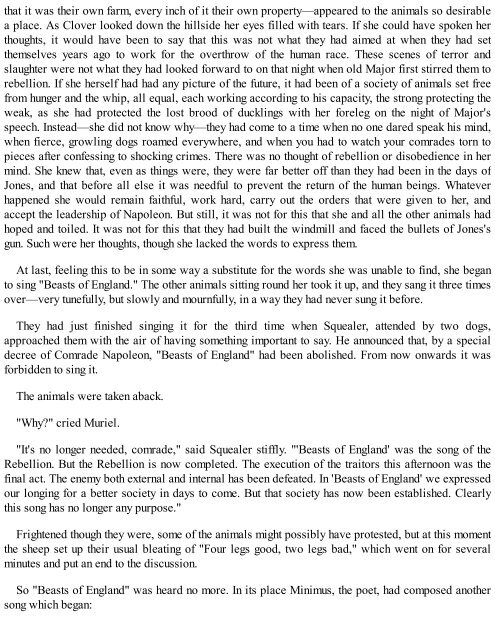Create successful ePaper yourself
Turn your PDF publications into a flip-book with our unique Google optimized e-Paper software.
that it was their own farm, every inch of it their own property—appeared to the animals so desirable<br />
a place. As Clover looked down the hillside her eyes filled with tears. If she could have spoken her<br />
thoughts, it would have been to say that this was not what they had aimed at when they had set<br />
themselves years ago to work for the overthrow of the human race. These scenes of terror and<br />
slaughter were not what they had looked forward to on that night when old Major first stirred them to<br />
rebellion. If she herself had had any picture of the future, it had been of a society of animals set free<br />
from hunger and the whip, all equal, each working according to his capacity, the strong protecting the<br />
weak, as she had protected the lost brood of ducklings with her foreleg on the night of Major's<br />
speech. Instead—she did not know why—they had come to a time when no one dared speak his mind,<br />
when fierce, growling dogs roamed everywhere, and when you had to watch your comrades torn to<br />
pieces after confessing to shocking crimes. There was no thought of rebellion or disobedience in her<br />
mind. She knew that, even as things were, they were far better off than they had been in the days of<br />
Jones, and that before all else it was needful to prevent the return of the human beings. Whatever<br />
happened she would remain faithful, work hard, carry out the orders that were given to her, and<br />
accept the leadership of Napoleon. But still, it was not for this that she and all the other animals had<br />
hoped and toiled. It was not for this that they had built the windmill and faced the bullets of Jones's<br />
gun. Such were her thoughts, though she lacked the words to express them.<br />
At last, feeling this to be in some way a substitute for the words she was unable to find, she began<br />
to sing "Beasts of England." The other animals sitting round her took it up, and they sang it three times<br />
over—very tunefully, but slowly and mournfully, in a way they had never sung it before.<br />
They had just finished singing it for the third time when Squealer, attended by two dogs,<br />
approached them with the air of having something important to say. He announced that, by a special<br />
decree of Comrade Napoleon, "Beasts of England" had been abolished. From now onwards it was<br />
forbidden to sing it.<br />
The animals were taken aback.<br />
"Why?" cried Muriel.<br />
"It's no longer needed, comrade," said Squealer stiffly. "'Beasts of England' was the song of the<br />
Rebellion. But the Rebellion is now completed. The execution of the traitors this afternoon was the<br />
final act. The enemy both external and internal has been defeated. In 'Beasts of England' we expressed<br />
our longing for a better society in days to come. But that society has now been established. Clearly<br />
this song has no longer any purpose."<br />
Frightened though they were, some of the animals might possibly have protested, but at this moment<br />
the sheep set up their usual bleating of "Four legs good, two legs bad," which went on for several<br />
minutes and put an end to the discussion.<br />
So "Beasts of England" was heard no more. In its place Minimus, the poet, had composed another<br />
song which began:









![Genki - An Integrated Course in Elementary Japanese II [Second Edition] (2011), WITH PDF BOOKMARKS!](https://img.yumpu.com/58322134/1/180x260/genki-an-integrated-course-in-elementary-japanese-ii-second-edition-2011-with-pdf-bookmarks.jpg?quality=85)
![Genki - An Integrated Course in Elementary Japanese I [Second Edition] (2011), WITH PDF BOOKMARKS!](https://img.yumpu.com/58322120/1/182x260/genki-an-integrated-course-in-elementary-japanese-i-second-edition-2011-with-pdf-bookmarks.jpg?quality=85)





